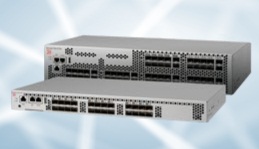Brocade Touts Ethernet Fabric And Open Cloud

Storage network vendor aims to take the data centre with 16Gbps Fibre Channel and an Ethernet fabric
Networking vendor Brocade has launched a set of new products for cloud-based data centres and service providers, including 16Gbps Fibre Channel and an open virtualisation architecture it calls Cloudplex.
Brocade is pitching Cloudplex against monolithic offerings like Cisco’s Unified Computing System (UCS), and new storage network products which provide 16Gbps Fibre Channel connections.
Data centres need to learn from storage
 Coming from a background in storage area networks (SANs), traditionally connected by Fibre Channel, Brocade is playing catch-up in the rest of the data centre. However the company believes that the data centre needs to learn from the “fabric” approach to networking which evolved in SANs, in which network connections are made through a highly redundant structure, without traditional hierarchies.
Coming from a background in storage area networks (SANs), traditionally connected by Fibre Channel, Brocade is playing catch-up in the rest of the data centre. However the company believes that the data centre needs to learn from the “fabric” approach to networking which evolved in SANs, in which network connections are made through a highly redundant structure, without traditional hierarchies.
“There is a race for fabrics,” said Marcus Jewell (pictured), country manager for the UK, claiming that Brocade’s VDX Ethernet fabric switches, announced a year ago and delivered in January, are the industry’s first – with Juniper’s QFabric product, launched in February, a belated response, along with the announcement of Cisco’s Fabricpath protocol.
Ethernet fabrics such as Brocade’s VDX (below) are intended to change Ethernet into a “flat, lossless Layer 2 network, with an intelligent, self-healing distributed architecture,” said Jewell. “SANs had a large flat network, and we are taking that to Ethernet.”
 In the process, fabrics will do away with Ethernet’s spanning tree protocol, which Jewell says is wasteful, as it uses manual effort and wasted hardware to guarantee there are no loops in a dynamically configured network.
In the process, fabrics will do away with Ethernet’s spanning tree protocol, which Jewell says is wasteful, as it uses manual effort and wasted hardware to guarantee there are no loops in a dynamically configured network.
“Why configure a network so half of it is switched off?” said Jewell. Despite standards arguments in the past, over how to replace the old protocol, Jewell believes the current IEEE standards such as Data Center Bridging will ensure products can be open.
Brocade is playing a big part in the two major open standards groups for data centres and the cloud: OpenFlow – a group working on data centre networking which includes Google, and OpenStack, an open source group working on software interfaces for cloud services, which includes Dell and Rackspace.